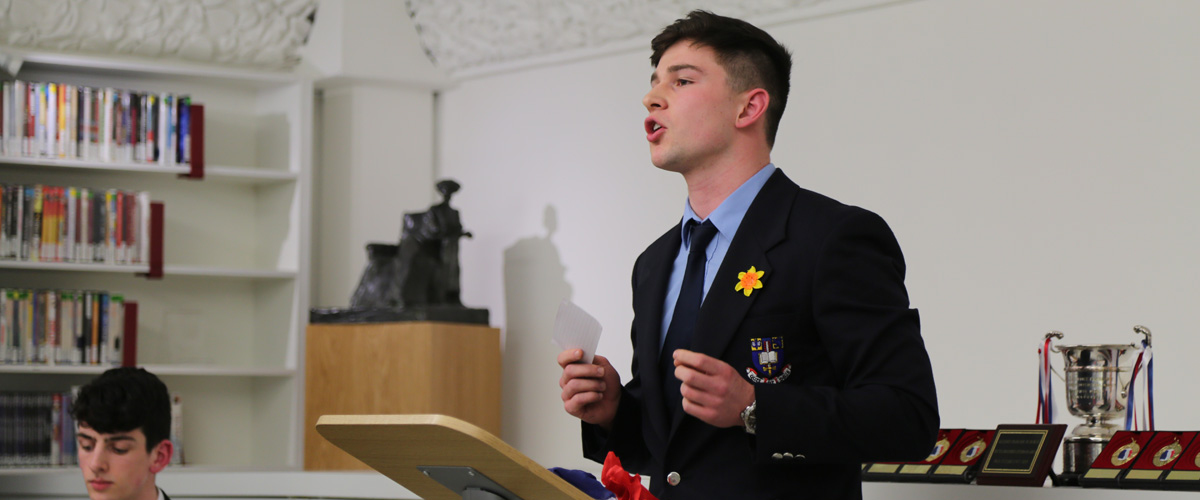Joutes Oratoires – Notes on Speeches

Each speech is THREE minutes long. The first 40 seconds are protected, and a bell will be rung to mark the end of protected time. After 40 seconds, the opposing team can heckle the speaker. The heckle is NOT a component of the allotted time of three minutes ; the clock will be stopped during this time and will resume after the heckle.
In opening rounds, there is only ONE heckle per speech, but in the semi-final and final, TWO heckles are allowed.
A warning bell will be rung after two minutes and again after three minutes. Penalties will be incurred if a speaker exceeds the three minute mark, but there is lee-way of about 15 seconds or so. (In the later rounds of the competition, the lee-way is upped to about 25 seconds because speakers have to deal with more complex issues.)
The captain must define the motion and define the teamline. The definition of the motion must be fair and not so narrowly defined as to make it impossible to oppose. A well-defined motion is important for the team.
The captain must give a brief outline of the content of the rest of the team’s speeches and then make an argument of his/her own.
The Captain’s speech cannot be interrupted by the opposition.
Please note that this is a change to previous rules.
The Captain of the Proposition will be the final speaker of the debate. He/She will summarise the team’s arguments and refute the opposing team’s arguments. No new material can be introduced in the résumé. The résumé cannot be interrupted.
The captain must also define the teamline and he/she can take issue with the proposition’s definition of the motion, should they wish. He/She must give a brief outline of the content of the rest of the team’s speeches and then make an argument of his/her own.
The Captain’s opening speech cannot be interrupted by the proposition.
The Captain of the Opposition will summarise his/her team’s arguments before the Captain of the Proposition. He/She will summarise the team’s arguments and refute the opposing team’s arguments. No new material can be introduced in the résumé. The résumé cannot be interrupted.
A good résumé is essential for the team! The captain must make an effort to address the arguments of the opposing team.
- Speeches must have a clear focus.
Exemple : Mesdames et Messieurs, je vous parlerai ce soir de l’aspect économique de la thèse.
- Speeches should have suitable examples to illustrate the argument. These examples can be anecdotal and/or statistical. However, it is not enough to rely on examples. They are to be used to reinforce the central argument of the speech.
- A nicely-placed quote is always welcome !
- A dash of humour is equally welcome !
- Each speech should have a clear structure – introduction, development and conclusion. Bear in mind that it is NOT an essay ; long-winded or overly complex sentences can actually take from a speech.
Each speaker should try to include some refutation in their speech. This shows that they have listened to the opposing team and are able to speak spontaneously. The refutation does not have to be linked to the theme of the speech ; for example, a speaker could begin by refuting an argument from a previous speaker and then begin his/her speech.
As the debate progresses, there should be more refutation in speakers’ speeches, so the 4th speaker in a team will have to leave time for refutation when preparing his/her speech.
- Speakers must not read their speeches. This will be heavily penalised by the judges.
- Speakers should use cue cards rather than paper.
- Speakers must make an effort to make eye-contact with the audience, opposing team and judges.
- A speaker’s accent and pronunciation will be taken into account by the judges. A speaker does not have to have ‘native’ standard pronunciation to be highly marked by the judges.
- Usually, there is no podium for speakers, so they should practise without a podium in their schools. It is not necessary for a speaker to stand in one position ; freedom of movement is allowed, within reason !


